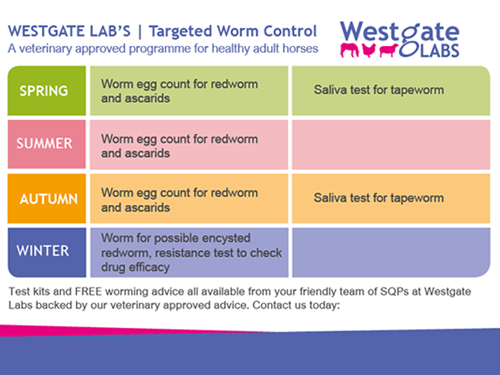
Harry Hall One Club members can access 16 additional benefits with their membership. These benefits include money off events, discounts on therapy systems, arena mirrors, trailer hire, personalised gifts, brownies, magazine subscriptions and horse wormers and more.
In this blog we speak with Westgate Labs to hear how good pasture management and animal husbandry techniques can help reduce reliance on chemicals to control your horse’s worm burden. We also look at when you should test your horse for worms and how to test.
Pasture Management advice for horses:
- Keep horses with the same grazing companions for herd stability. Rest and rotate grazing and don’t overcrowd fields.
- Poo-pick as much as possible, at least twice a week to keep parasite levels down. Cross graze pasture with other species if possible eg. Sheep and cattle.
- Keep new horses separate until tested and treated accordingly.
- Don’t worm and move; after worming ensure horses stay on the same pasture for a few days to help slow down resistance.
- When first starting on a targeted worm control programme all horses should be tested when worming is due or slightly overdue to get a true result.
- Check for resistant worms; if a positive result is found, treat the horse then sample again in about 10-14 days. If the wormer has been effective the second count should be either ‘no eggs seen’ or very low.
When to test your horse for worms
There are two tests that should form the basis of an effective targeted worm control programme – worm egg counts for redworm and roundworm and the EquiSal saliva test for tapeworm. Both tests give statistical results for the levels of parasites present that can be used to determine whether the horse needs treatment or not.
You may also need to consider bots, pinworm, lungworm and liver fluke in your programme if you suspect a problem. Consult your vet if you have any initial worries about these types of worms.
When should you test?
A mature, healthy horse can follow a very simple pattern of testing and dosing. The basic idea is to test a small dung sample about three times a year to check for the presence of redworm and roundworm and a saliva sample twice a year to test for a tapeworm infection.
A suggested programme
Worming is only required if the tests indicate infection above a certain level. Complete the year by treating for possible encysted redworm in winter. Foals, youngsters, neglected or older horses will require more attention.
Don't forget as a Harry Hall One Club member you can benefit from 10% off all products and services including a variety of different parasite test kits, season packs and the new faecal sand test. Login in to your account to access the discounts.
The following programme is a good basis for a healthy adult horse:
Westgate Labs have a subscription service so that following a best practice parasite control programme is easy for busy horse owners.

